Category: Uncategorised

Tanks for everything…
A great article from Laura Hadland written for Vineyard Magazine where she caught up with our very own Harry Pickering.
For those approaching the subject for the first time, there can be a bewildering array to choose from. Materials might include stainless steel, concrete, oak, plastic or even clay. Each comes with its own advantages, disadvantages and price tag. So how does one negotiate the tricky business of tank selection?
Tank selection
- Look at vineyard size and predicted production volumes. Not only do vessels need to be able to accommodate all of the juice produced at harvest, but consideration needs to be given as to how this will be divided up by style.
- This leads us on neatly to style and quality considerations. Different materials offer the potential for different outcomes at the end of the process. Stainless steel is perhaps the most common and relatively cost-effective material, leading to crisp, clean wines. Oak vessels come at a significant price but can add more complex layers of flavour to the finished product.
- For some winemakers, environmental impact and sustainability are at the heart of their working practices. For them, the environmental impact of their tanks – how they were produced, how energy efficient they are and how recyclable they will be at the end of their life – can be a critical factor in selection.
- I’ve alluded to the price already, but it isn’t just the upfront costs that need to be considered. Maintenance and the longevity of different tank types also need to be factored in so that an informed investment can be made that will keep the business in good shape over the years and decades to come.
A material question
Let’s look at some of the different types of tanks that are available in more detail. What do different materials add – or take away – from the finished wine?
Mixing materials
Stainless steel has become the industry standard. It’s an inert vessel, easy to keep clean and relatively affordable. But sometimes, a pure expression of the fruit isn’t all that’s required. Some winemakers look to add depth and complexity to their wines by blending liquid fermented in a range of materials.
In Hampshire, the Grange Estate’s Classic NV English Sparkling Wine is fermented 86% in stainless steel tanks and 14% in old oak barrels before undergoing a 33-month lees ageing process in bottle. The Grange Estate have recently moved into their own newly-built winery facility. Until 2022, their vinification took place at Hattingley Wine Estate, but now winemaker Harry Pickering has greater control over the vessels he sources and how he uses them to achieve the depth and complexity of flavour he is looking for.
“We ferment a bit of everything in barrel as well as in tanks. It gives you two different components to play with from the same fruit. For us, we find anywhere between 80% to 90% for the stainless steel tank fermentation is where things sit nicely.
“The tank components are the bones of the wine when we’re looking at blending, that’s the main structure. The fruit components are more obvious and it’s more structural in terms of acidity. By fermenting in tanks you get the pure expression of the fruit because they are in the most inert vessel and completely unadulterated.
“On top of that, you start to layer the oak. The majority of the oak we’ve used up until now is old oak, fourth fill. Those barrels come from a Tonnellerie in Champagne. They sell Champagne barrels to producers in Bordeaux and Burgundy. After they’ve had the yeast in them for four years fermenting white wines, they take them back and distribute them out to people who want older oak. The reason for going through this Tonnellerie is purely a reputational thing more than anything, in terms of knowing that the oak you’re going to get is being properly quality controlled. You’re trying to limit any spoilage or microbes being in that wood, so you need to know the provenance of the old oak to limit the risk of contamination.
“The idea is not to impart those oak tannins and give the wine an oakiness. It’s more about the micro oxygenation that you get from the oxygen being able to permeate through the wood during the ferment and ageing, compared to a stainless tank. In a barrel, there is a lot more surface area of the wine in contact with the yeast lees and the surface area of the barrel itself. That allows for more exposure to oxygen and more exposure to the dead yeast at the bottom of the barrel post fermentation. In turn, that leads to autolysis and the breakdown of the yeast. The mannoproteins that you’re getting from the dead yeast soften the wine and add those soft and buttery autolytic characters.
“So the old oak softens and it broadens the palate. That’s adding the flesh onto the bones. We find that between 10% and 20% in old oak is where that sits nicely. It’s about the balance between softening the wines, but still having them maintaining their structure and core personality. They’re not becoming overly flabby, just softening and rounding out the palate.
“Since we’ve had the winery, we are beginning to play a bit with new oak, which adds a third dimension to the whole thing – almost like the accessories that are added to clothing. But the amounts that we are adding are so tiny that you can barely perceive them. We only add about 1% to 5%. It ripens up the fruit and makes the wine a bit more serious. It’s almost like turning the volume up a bit. It’s not about changing it dramatically and making an oaky wine, it’s about adding a bit of perfume, that little bit of personality at the very end.
“Because this is a new thing for us, we’re still working out which Tonnellerie suits our needs. Each year we’re going to use a new one, look at their barrels and see how they work for us. Then we’ll hopefully end up with five or six different Tonnelleries’ barrels in the winery over the next few years, that are toasted to different degrees, and increase volumes depending on who we like most. I imagine it will always be a range of them because they will offer different things and it’s useful to have that diversity for blending.”
READ MORE https://www.vineyardmagazine.co.uk/wine-making/tanks-for-everything/
https://www.vineyardmagazine.co.uk/wine-making/tanks-for-everything/

Rethink PINK
We get a lot of people on our tours saying “I can’t drink/hate rosé/PINK…” and this speaks to us of some terrible past trauma – over-fruity, ultra-sweet glasses of what looks and tastes like warm, fizzy and dilute Ribena, consumed in an airless tent on a boiling hot day – and, therefore, our hearts go out to them, we have been there too!
But this is exactly why we designed our PINK NV differently – on tours we offer these PINK refuseniks a glass and watch the scales fall from their taste-buds…
It is, perhaps, the best kept secret within our wine portfolio – a 60/40 blend of Meunier and Pinot Noir that tastes almost like a CLASSIC!
TASTING NOTE
Pale onion skin in colour with a little, barely pink, white peach. Is the colour important when it comes to the flavour? We think so, BUT don’t judge a book by its cover ladies and (especially) gentlemen. There is nothing too sweet here…
The nose has almost macerated red berry fruits but also grapefruit pith alongside crisp red apple, with a lick of something creamy. With 33 months on lees and 8 months on cork the complexity is starting to build with the fruit surrounded by cream, hazel and spice – and the very long finish is beautifully savoury and very slightly saline.
PAIRINGS
The PINK NV is fresh with layers of red fruit, pastry, cream and citrus which allows it to pair brilliantly with a variety of foods…
Try it with everything from fresh salads and seafood through to fried and spicy dishes like fish and chips, cumin-spiced dahl, chicken schnitzel and goats cheese risotto… not to mention fruity desserts, cream and chocolate.
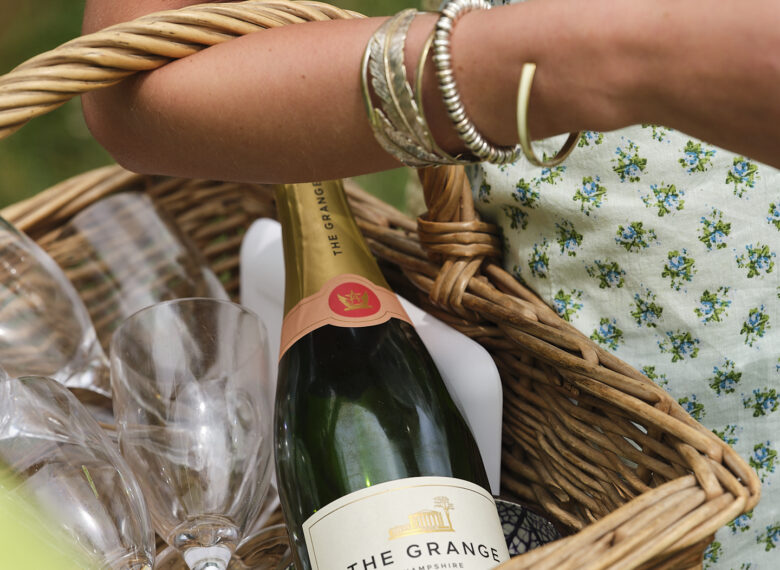
Pink, it's my new obsession...
Pink, it's not even a question...
Pink, on the lips of your lover...
'Cause pink is the love you discover.
Steve Tyler - Aerosmith
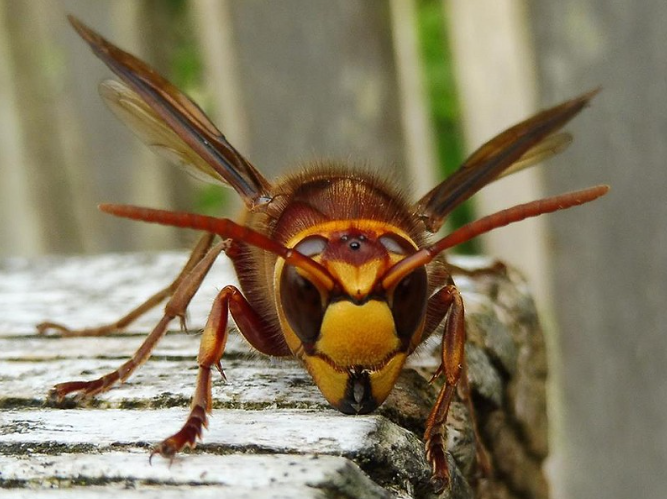
The Wine Widow on Cicadas, Hornets and Nuns
This year, in America, two broods of cicadas have emerged together for the first time since 1803: Brood 19 which appears every 13 years and Brood 13 which pops up every 17 years. When they appear in the same place at the same time, such as Illinois, the noise was so loud that locals called the police. I know this because I bought the Junior Week by mistake at Waterloo and it was my only reading material on a broken down train that stranded it’s passengers for over an hour somewhere near Basingstoke. A long time after finishing it, I went to put my empty coffee cup in the bin – as an outing – where a woman was sitting on the floor feeding a rabbit lopping about by her feet.
I think about the cicadas because the kitchen has begun to drone alarmingly with hornet upon hornet. They are enormous, they are scary, and they are very noisy. “Hornets are not aggressive” Zam tells me as I discuss ways to exterminate them. “And they’re having a very bad time. The wasps have taken over their nest in the shed” he adds, as though this will convince me where my sympathies should lie. “I’M having a very bad time” I shout as one gets stuck in my hair.
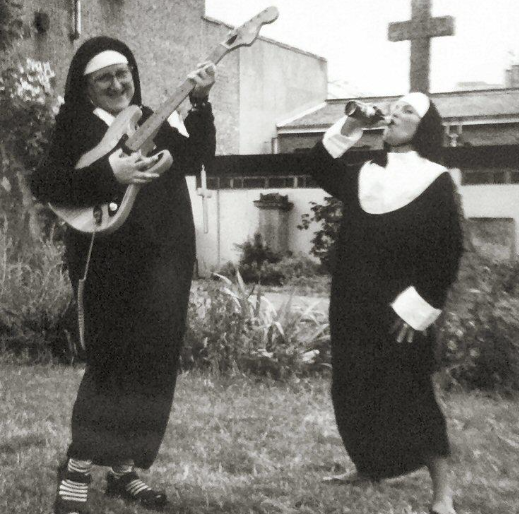
I then remember the woman with the rabbit and how I mentioned this to the two women I had befriended as we discussed ways to get off the train. “I think I’m in a dystopian nightmare,” I said. “There’ll be a nun with a guitar next” one of them replied.
Zam comes home worried about record breaking rain, September sun, weirdly cold nights, violent storms … weather. “And spotted wing drosophila” he adds. Oh DEAR, I try to sound sympathetic as I hoover up hornets that have died of natural causes near the sink. On the floor. And most window ledges. No sign of a singing nun yet though.
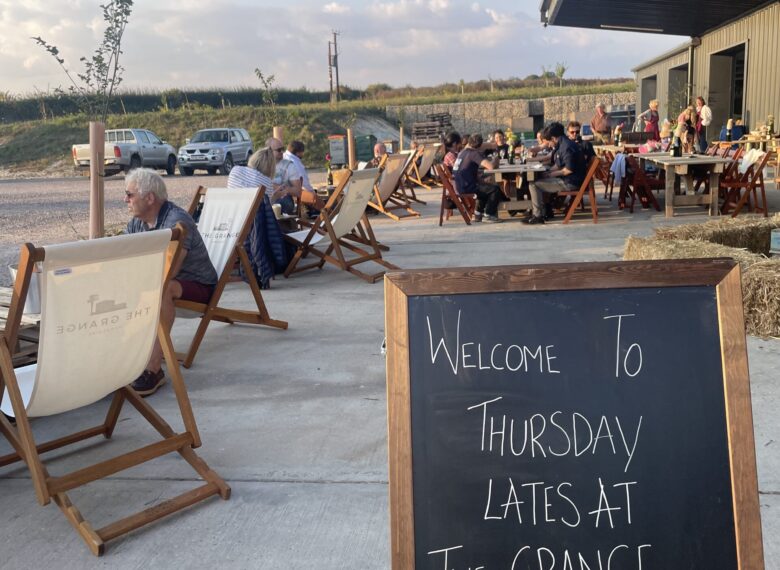
Thursday Lates
Join us at the vineyard to while away a few hours on a Thursday evening this summer.
Every Thursday from now until mid/late September, we will be firing up the BBQ and opening the bar under the canopy at the winery from 5:30pm -8:30pm.
Good vibes, wine, food, friends basking in the summer sunset!
Drink our wines, have a bite to eat and relax watching the sun go down. We are collaborating with @cooper.becka who is dreaming up some sublime menus, taking advantage of delicious wild game from the Estate.
Pretzel rolls filled with barbecued partridge, venison or pigeon with fresh salsa verde, roasted tomatoes and harissa or mayonnaise as well as Coop’s amazing vegan burger and some lighter snacks like Padron peppers and BBQ halloumi. The Landy bar will be in full operation, serving wine by the glass and by the bottle.
Our award-winning PINK NV, WFB 2020 and STILL PINK 2023 chilled and ready to serve.
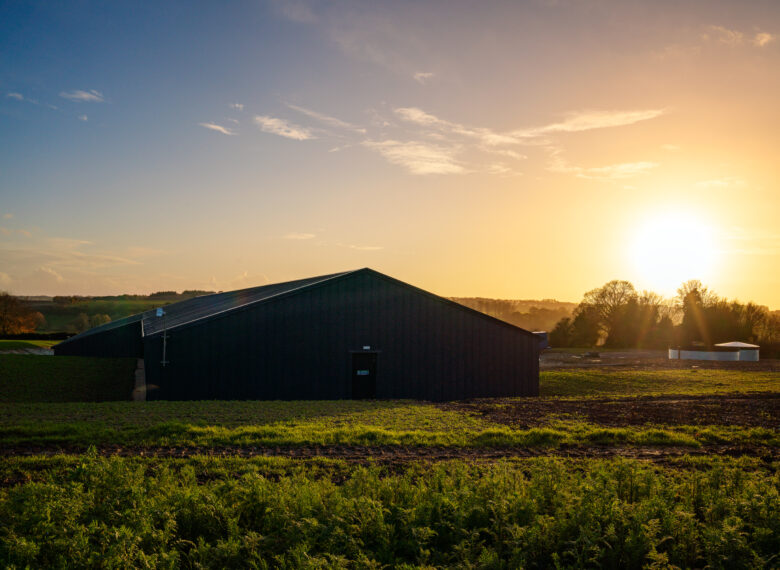
The mags are tasting epic!
Taste our wines by the glass or bottle and compare notes to the same wines in magnum. We are offering all magnums by the glass to savour. A rare treat to understand and ponder the way a wine shows different characteristics being aged and bottled under different conditions.
A gently immersive experience on the terrain from which the wine has come, the smells and the sights are even more alluring on a warm summer breeze.
No need for tickets, come up, park, get a glass and a bite, find a chair and chill...
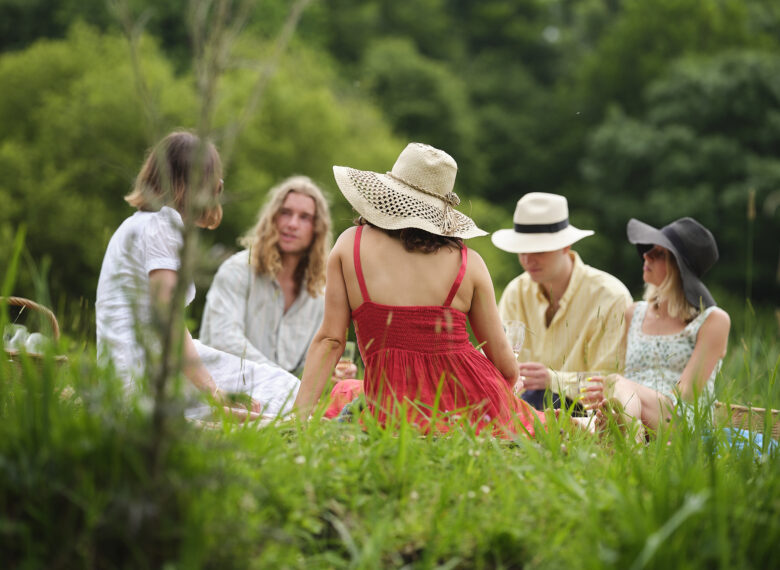
Sun! Sun! Sun!
We hope you are looking forward to a last (and possibly only?) hurrah of BBQ’s, picnics and chatting in scent-filled summer gardens and we’d love to be providing the refreshments!
We’re both sorry and delighted to say that, thanks to some very strong demand from the trade, the CLASSIC NV has sold out (though you can still get supplies from our retailers). But in its place can we point you in the direction of some other options?
First up, for the CLASSIC lover, how about the 2016 vintage CLASSIC in magnum? This wine has been delighting the THURSDAY LATES crowd and according to Harry is “… reminiscent of delicately poached orchard fruits with a smooth, creamy palate and a very long, savoury, finish.”
Next up comes our International Wine Challenge '24 GOLD medal winner, the WHITE FROM BLACK 2020. With over a year on cork this linear and elegant wine is beginning to develop a delicious nuttiness on top of the succulent stone fruit and quince flavours.
“Luscious white stone and orchard fruit on the nose that integrates with lightly toasted nuts, sweet spice, and buttered patisserie. The palate is oily and mouthcoating yet balanced by a refreshing saline acidity. An exciting new successor to the 2018 WHITE FROM BLACK gold medal winner."
Or you could go for sparkling PINK NV followed by STILL PINK 2023 and finish with 2018 PINK in magnum… fill up because this might be the last of the summer wine!
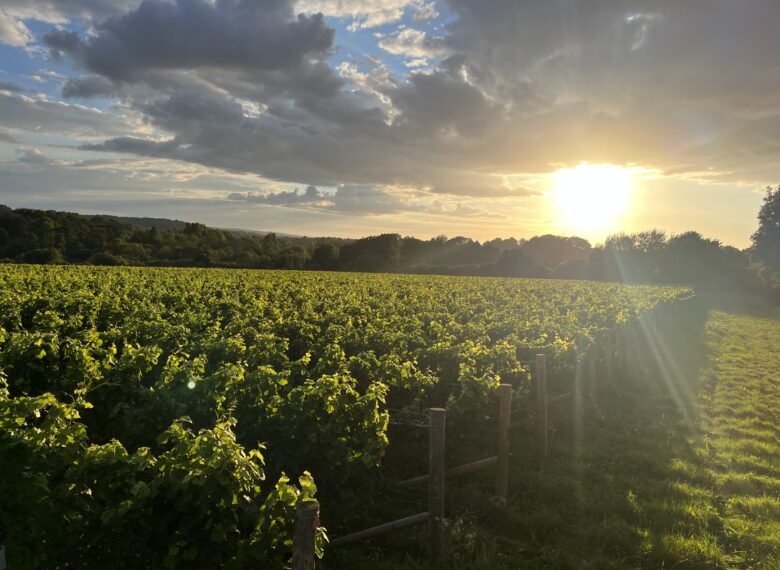
The view from the vineyard...
We hope that you have enjoyed this weather more than our vines have! Samuel has somehow kept his tail up and the outlook for September is (at least at this moment in time) brighter, so positivity is the order of the day. Nevertheless, I’d give a lot for three weeks of sun between now and mid-October, when the chaos that is harvest begins - we shall see. Thankfully ‘22 and ‘23 were very good harvests so maybe we are due a poor one…
By the way, if any of you fancy getting your hands juicy at harvest, let us know and we’ll sort out some buckets and a pair of snips!
Running through September and into November, we have our regular vineyard tours on the dates on the website but, should you want to organise a bespoke tour, drop us a line.
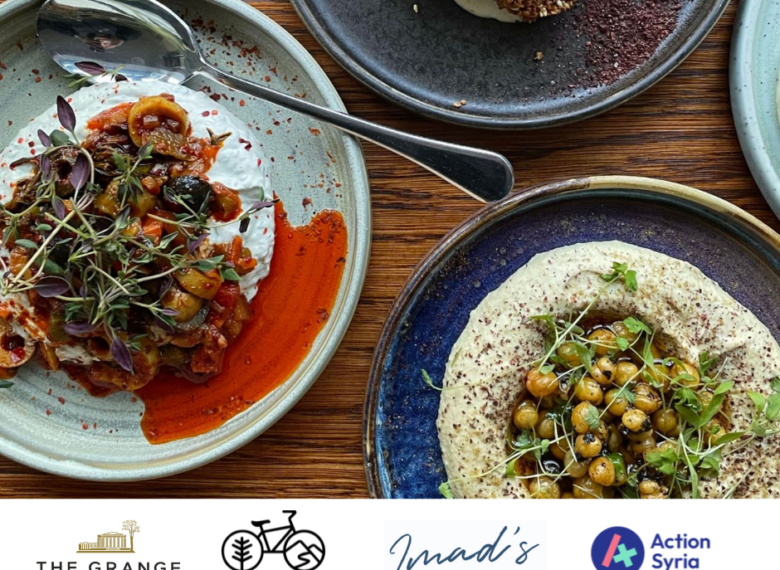
The Slow Table – Imad’s Syrian Kitchen
Join us for a very special Slow Table.
On Thursday 5th September, we’re teaming up with The Slow Cyclist at the winery to host a celebration of Syrian culture and cuisine. The wonderful Imad Alarnab of Imad’s Syrian Kitchen will be cooking up a fantastic feast to be accompanied by our award-winning wines. And there’s even a chance to stay over and (slow) cycle through the Hampshire downs with us the following day.
All profits will go to Action Syria UK, a charity that offers vital healthcare and education to Syria and beyond.
This is going to be a really special evening and we hope you’ll join us.
When we met Oli Broom, the founder of The Slow Cyclist back in September last year, we knew we wanted to work with him. This is a man who, in 2009, jumped on a bike and just kept going - eventually stopping 412 days later in Australia! A commitment not dissimilar to starting a wine business in England…
Beyond the respect for each others’ businesses, we found plenty of common ground - we are both focussed on creating products and experiences that we would enjoy ourselves always under-pinned by exceptional quality and original innovative process. It was clear that we have also similar ideals and visions for the world we inhabit.
Over the past 6 months, we have discussed and developed the evening and we’re delighted to have Imad join us working together on supporting Action Syria. His is an exceptional story of resilience and humility in the face of great adversity. His courage and tenacity is staggering but it is his passion for food, family and community that made for a perfect fit for our collaboration.
Now the plans are all laid and we’re ready to go - all we need is for you and a few friends to come and fill the seats for this our very first winery dinner…
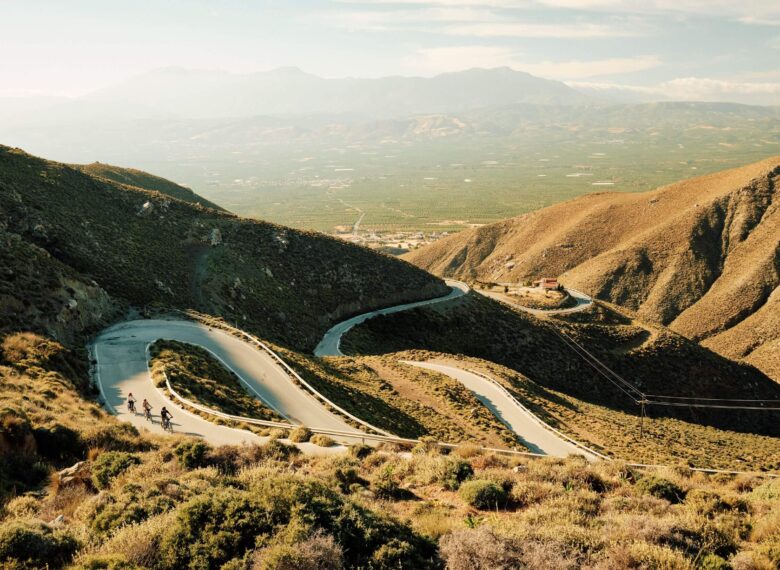
The Slow Cyclist offers extraordinary cycling and walking adventures for the culturally curious. They believe that travel is worth taking time over; that a great holiday means getting under the skin of a place, meeting its people, indulging in its culture and understanding its history and customs.
Having welcomed their first guests to Transylvania in 2015, The Slow Cyclist now takes guests to little-known corners of nine countries across Europe and Africa.
Imad Alarnab is a Syrian chef, entrepreneur and refugee who ran three successful restaurants, several juice bars and cafes in Damascus.
In the war, Imad's businesses were destroyed and he was forced to flee the country in search of safety. Making his way from Lebanon through Europe, Imad shared his skills cooking for other refugees, up to 400 at a time.
Imad arrived in London in 2015 and eventually his family was able to join him. Putting aside his passion for food, Imad worked a number of jobs, including as a car salesman in his early days in London. With the help of some good friends, Imad burst onto the London restaurant scene four years ago with a series of charity events which became hugely popular. Supper clubs sold out within hours and hungry workers waited patiently in long queues for take-away lunches at pop-ups.
Imad’s Syrian Kitchen opened in Kingly Court in Soho, London in early 2020 and has gone from strength to strength, allowing Imad to express his full vision.
https://www.imadssyriankitchen.co.uk/
Action Syria partners with local organisations in Syria and neighbouring countries to provide the support and aid that vulnerable communities need most and give you a way to help. They make sure funding gets directly to the right people quickly and safely.
They believe in giving Syrians a hand up, not a handout
They are currently teaching 200 Syrian refugee children, providing vital healthcare to a community of 50,000 people in north-east Syria, and delivering prosthetics to amputees in north-west Syria.
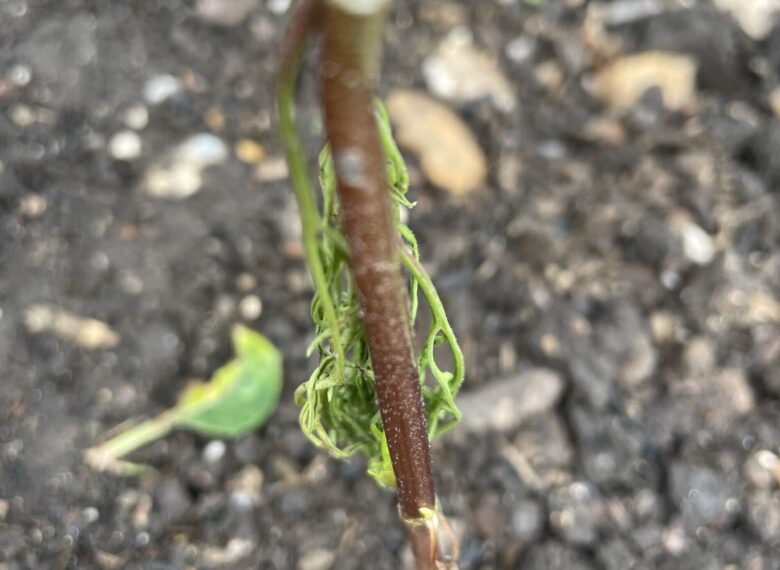
The Wine Widow on slugs, ale and eggshells…
I admired the orange geums and Zam took photographs of a multi-stemmed hazel for reference but the garden that really galvanised me at my first ever visit to the Chelsea Flower Show was in front of a beautiful greenhouse. Bushy broad beans, thriving salads, neat leeks… I wandered up the path towards a welcoming sales man. “Where are the slugs?” I said. I gave him no chance to respond before launching into my only current topic of conversation.
I go out at night with a torch and pick them off every pot in the greenhouse, I bury ale in deep dishes amongst the hollyhock and foxglove seedlings, I have invested in some pricey copper rings (so only have enough to do two beans and three delphiniums - beans destroyed, delphiniums currently surviving), I have scattered baked and crushed eggshells around every plant base and I have emptied coffee granules all over the place. Each morning I go out to find what damage has been done and increasingly to see if anything is left.
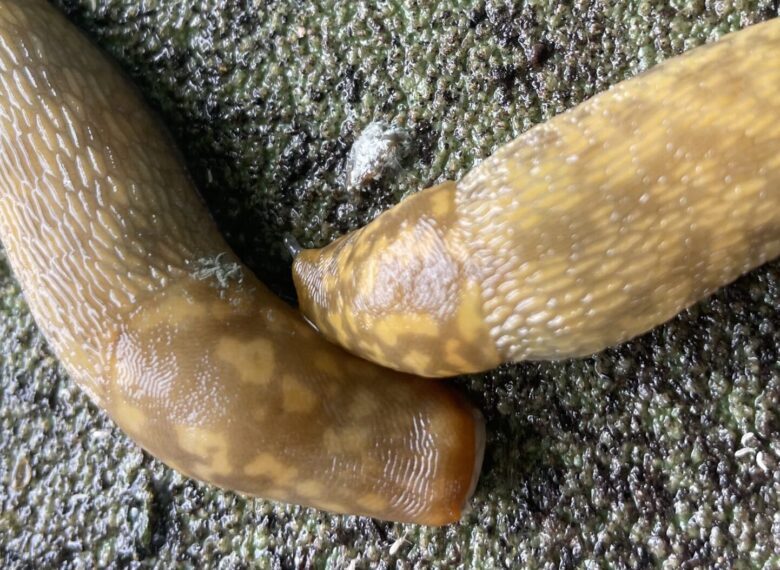
The man shifts uneasily. I sound deranged. “Well you know…” he says soothingly “this isn’t a real garden.” I refuse to find this cheering in any way. And then he tells me he overheard another exhibitor describe how he boils up garlic bulbs and sprays the water over his plants. “I think it was for slug protection” he says uncertainly. I realise he would like me to move along. I thank him. I compliment his greenhouse.
I come home to find the cosmos are the latest victims. I’ve been telling people these are the only plants that slugs don’t seem to like but this is wrong. They’ve just left them till last. Then I boil a kettle and pour it over some garlic bulbs.
The next morning I look at new levels of decimation. The garlic water has acted like a particularly attractive vinaigrette.

The Wine Widow – Water, water everywhere
“How are the vines?” I am asked by people with long faces. And then “how is your house?” This last question comes up in all wet weather because part of our house is less than 2 metres from a river and everybody assumes we will be flooded. To both these questions Zam smiles broadly and I try to sound as confident, “everything is fine, we’re on chalk.” As I type there are ominous sounds of branches breaking in the high winds – shallow rooted beech trees – because we’re on chalk. But while the roof may be in peril and the garden is pure moss, the floor is currently dry.
The vines, I’m told, are a week ahead of where they were this time last year. And so the inevitable Frost Question has raised its annual head. Zam plans to get a system that collects the rainwater off the winery roof which will be sprayed onto the vines during frosts which strangely keeps them safe. But not this year. For now it’s all alarm clocks and candles. One of last years Frost Warriors now lives abroad but has let it be known that he will fly back to England if he’s called up because he enjoyed lighting bougies at 3 a.m. so much. I am thinking about this remarkable enthusiasm when there is a knock at the door.
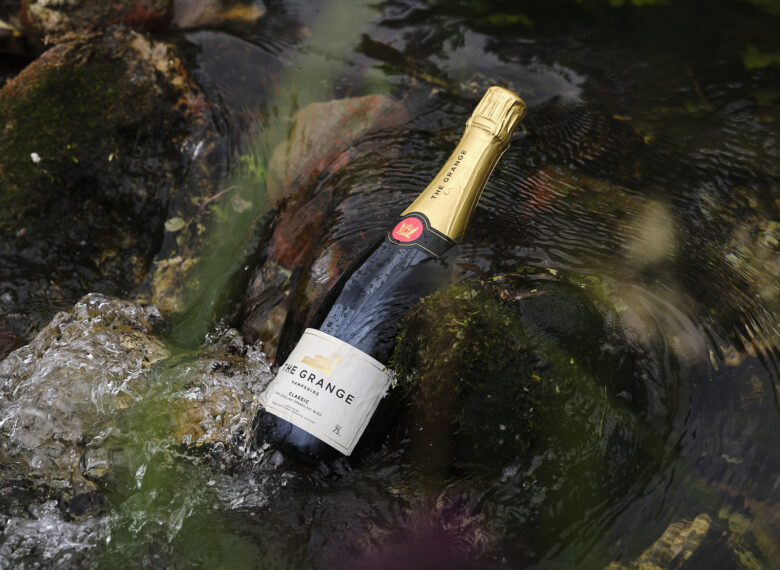
A man from Portsmouth Water is standing in the rain holding a long stick. He asks where the stop cock is which I happen to know because a different man from Portsmouth Water appeared in the rain at the door last week, holding a similar stick. This man also lifts the manhole cover and holds the stick to his ear and pulls a face. His “remote” system has told him that there is a leak somewhere. I suggest the tap that drips in the greenhouse but having seen this he dismisses it. “This sound” he offers me the stick to listen to “would imply a major internal leak.” His emphasis is a little alarming. And then he goes away because he can’t really tell while the dishwasher and washing machine are on. He will return on his night shift. I wander back into the house and stare at the floors. We’re on chalk. I’m sure it will be fine.
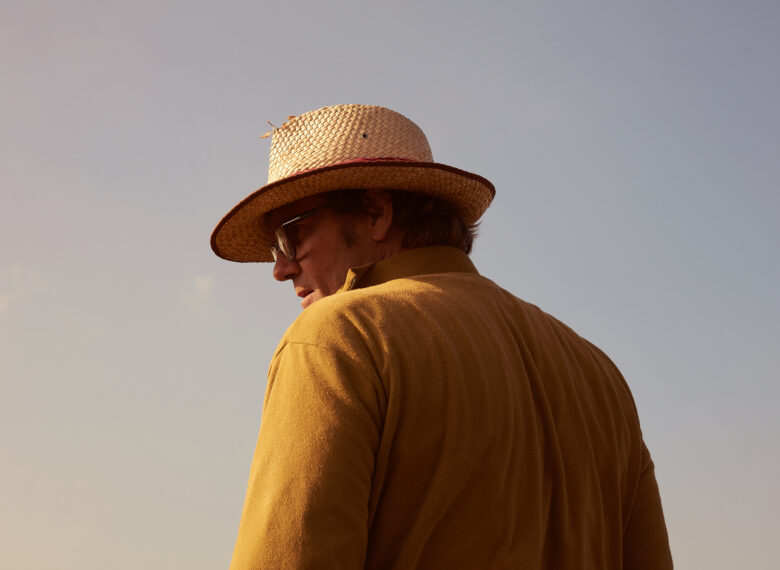
An Update FEBRUARY
Dear friends,
Well, even for February this has been a bit of a doozie… cold and dreary with plenty of added rain, enlivened only by the birthdays of those in possession of the best zodiac sign of all…
I have been marking the endlessly surprising arrival of the start of my seventh decade by taking each of my nippers out to dinner, one at a time, in a restaurant of my choosing. The Wine Widow is not a fan of restaurants, but I am and this cunning plan is giving me four bites at the succulent cherry that is London’s restaurant landscape. Seems mad not to make this an annual event?
In the vineyard the pruning is over, the pulling out is nearly done and the tying down is underway. This means we are approaching peak tidiness – the trellising empty, wires lowered, each vine a picture of dormant potential, canes demurely bowed, waiting for the warmth to raise the sap, swelling 8 to 10 buds on each cane into delicate, silvery leaf…we just have to pray it doesn’t start until after the last frost!
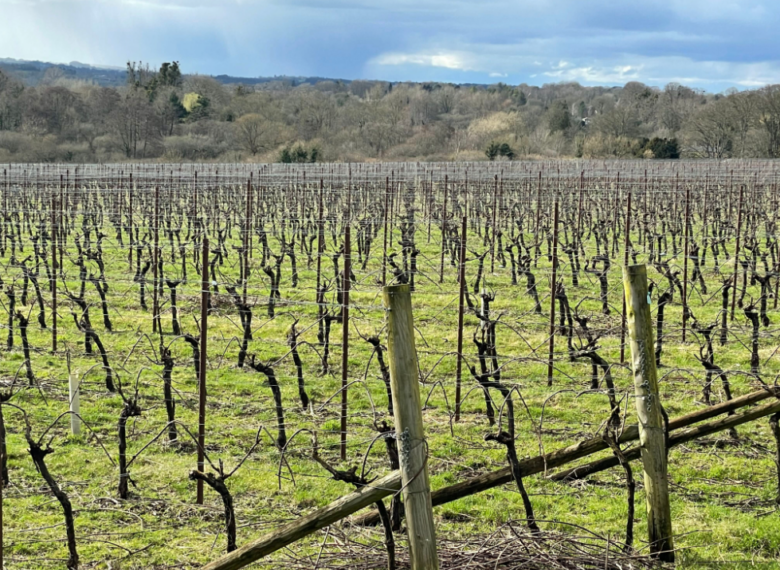
In the winery the blending is over and our teeth are recovering – tasting 30-odd highly acidic base wines really tests the enamel and we could all do with a visit to the dentist - but it will be worth a bit of pain because the wines were really revelatory… That wet mid-Summer followed by a baking early Autumn seems to have done something wonderful to the Chardonnay – the aromas we’re used to, of green apple, citrus and pear drops, have not been obliterated but they have been overlayed by scents of succulent peach, nectarine and apricot. Despite worries about dilution there is plenty of acidity to hold the wines together and Harry and Juan are very excited to see what these new flavours will turn into… in just 3 years’ time.
Yours,
Zam

The Wine Widow on toast, repairs and being good in a crisis
We have two broken toasters in the house, both of which have been dud for years. Actually I never knew one of them when it worked, it having been brought here from his father’s mending pile to join ours, many years ago. The other toaster, given to me over 30 years ago, has done me well before packing up in about 2018. Since then both have been waiting for the practical man to … I don’t really know … source parts, take them apart, put them back together again? I believe that’s what is meant to happen.
Friends who come to stay look very confused and a little downcast at breakfast where there is therefore a poor toasting game. Bread is put on the right hand plate of the aga and if you time it right might be turned before burning/sticking to it. Most days I open the hot plate to find a charred piece of bread that Zam has forgotten before heading to work. When I found this again last week I took a unilateral decision to invest in a new toaster.
I googled and I couldn’t decide so I paid a visit to a well known department store in order to see for myself, feel their sturdiness and so on. There were several models, all of which were for display with an accompanying notice that read “available online” which defeated the object obviously of coming home with a goddam toaster. This failed mission gave Zam the chance to beg me for another week before I condemned him to useless consumption with built in obsolescence.
I think is how he termed it.
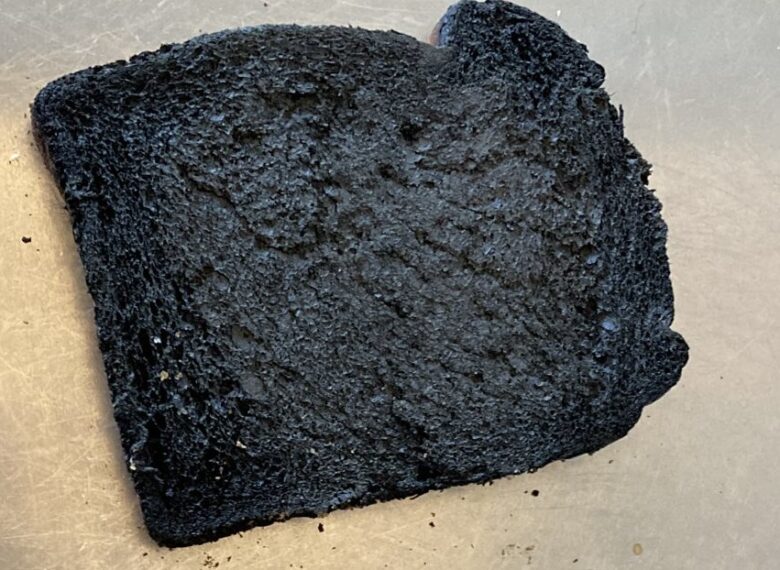
Yesterday Zam locked his keys in the boot of his car as he was heading out with wine deliveries. I found two spare sets in the drawer and drove them over but neither worked so I went to Halfords and bought new batteries and bleep bleep, all was good. This reminds me of the one and only time I have been a sensible parent: One of our children, then aged about 4, stuck a bead up his nose and every time I said “blow” he sucked in his nostrils with intensity. Luckily my godson had put a frozen pea up his nostril some weeks earlier and at A&E the medic sucked it out with a straw. Which is what I did with the bead. This was a very proud moment for an impractical woman.
I have also solved the toaster issue. I have oatcakes for breakfast.







